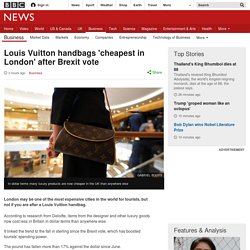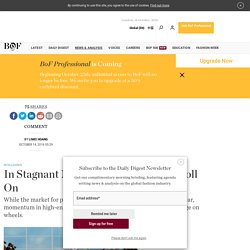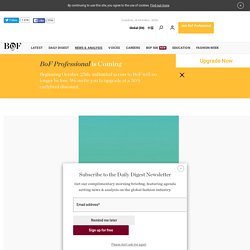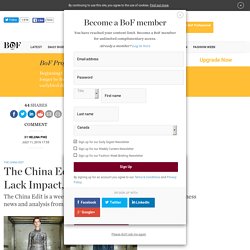

6 effects a Brexit may have on the Fashion industry. London - With the EU referendum just a number of days away, both sides 'Remain' and 'Leave' are pushing hard to make their voices heard. As the rest of the world holds its breath and waits to see which way the pendulum will swing on Thursday, June 23, several prominent members of the UK's fashion industry voice their thoughts on the matter. Industry leaders including the likes of Vivienne Westwood, Ashley Williams, Jonathan Anderson and Claire Barrow have all publicly voiced their support for the staying in the EU, while other designers such as Christopher Raeburn, Sibling and Daniel W Fletcher used their catwalks shows during London Collections: Men (LCM) as platforms to show their support.
A survey conducted the British Fashion Council revealed that 90 percent of British fashion designers will vote to stay in the European Union on Thursday, versus the 4.3 percent who will vote to leave. Devaluation of the pound End of free trade, posing a 'serious risk to growth' Louis Vuitton handbags 'cheapest in London' after Brexit vote. Image copyright GABRIEL BOUYS London may be one of the most expensive cities in the world for tourists, but not if you are after a Louis Vuitton handbag.

According to research from Deloitte, items from the designer and other luxury goods now cost less in Britain in dollar terms than anywhere else. It linked the trend to the fall in sterling since the Brexit vote, which has boosted tourists' spending power. The pound has fallen more than 17% against the dollar since June. According to the research, which was prepared for the Wall Street Journal, a Speedy 30 handbag from Louis Vuitton cost £645 in London as of 7 October, or $802. That compared to €760 ($850) in Paris and $970 in New York. 'Demand pull' Nick Pope, fashion and luxury lead at Deloitte, told the BBC a "period of affordability" after the EU referendum vote was proving a "demand pull" for tourists, who account for more than half of the UK's luxury goods market "People don't like paying more for the same product.
" Image copyright AFP. In Stagnant Market, Luggage Brands Roll On. LONDON, United Kingdom — In the first four months after it launched, luggage brand Raden made around $2 million worth of sales from its website and Manhattan showroom.

The company, which sells just two sizes of luggage in a range of different colours, is on track to meet its target of $12 million in sales for its first nine months, according to founder and chief executive Josh Udashkin — a former lawyer and director of international development for shoe retailer Aldo. “We are growing [at such a fast pace] that we can’t keep our products in stock, which is a good problem to have as a young company,” he tells BoF. “I think people are really attracted to the simplicity of the purchase experience.” Its two products, simply named “Carry” and “Check,” retail for $295 and $395 respectively, both feature glossy exterior shells, as well as built-in chargers, an integrated weighing scale and sensors that allow users to check their bag’s location via an app. Related Articles: The Growth Conundrum. LONDON, United Kingdom — Fashion and luxury brands can no longer count on rapid expansion in China for automatic revenue and profit growth.

The weak dollar and explosion of Chinese consumer spending that, together, drove easy double-digit growth for much of the last decade are no more, with the global market for personal luxury goods eking out only one to two percentage points of growth in real terms in 2015, according to consulting firm Bain & Company. The situation is particularly tough for fashion’s luxury megabrands — like Burberry, Gucci and Louis Vuitton — which, in recent years, have overexpanded their retail networks and can no longer depend on simply opening new stores to drive growth. This is especially true in Greater China, where many luxury mega-brands have built sprawling retail portfolios that are no longer economically sustainable. Consumption in other major economies is cooling. Chinese citizens made over 100 million trips overseas in 2014. Hong Kong Designers Lack Impact, Brexit and Tourists. "Fashion Faux Pas: Why Hong Kong Designers Struggle to Make a Global Impact" (South China Morning Post) "Despite the government investing huge sums and the undoubted creative talent in the city, questions remain about the best way to develop the industry.

" "Op-Ed | Why the Brexit Will Deter Chinese Tourists" (Jing Daily) "Chinese tourists are generally very risk-averse and plan their trips in detail — but the unclear situation following the British referendum leaves both the Brits and the Chinese with more questions than answers. " "Alibaba Goes Off Track" (Bloomberg) "Alibaba's plans for online-to-offline commerce are going off track.
" "VCs Are Betting on the Great Chinese Fitness Boom" (Tech Crunch) "China, it seems, is in the midst of a workout craze — and that represents a once-in-a-lifetime opportunity for venture investors. "